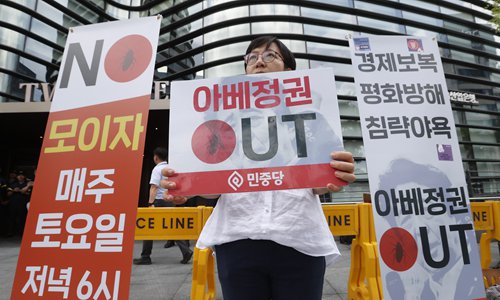HOME >> OPINION
Chips are down for South Korea-Japan ties
By Chen Yang Source:Global Times Published: 2019/8/5 19:43:42

A South Korean protester denounces Japan's cabinet in front of the Japanese embassy in Seoul for removing South Korea from a "white list" of countries with preferential trade status, which will hurt South Korean importers. Photo: IC
The Japanese cabinet approved a partial amendment to the Export Trade Control Order on Friday, removing South Korea from a "white list" of trade partners with preferential treatment. The order will be implemented on August 28.
At an emergency cabinet meeting convened on Friday, South Korean President Moon Jae-in emphasized that countermeasures are on the way.
Countries on the "white list" are identified by Japan as its trusted partners in view of national security. They enjoy preferential treatment with simplified procedures when importing strategic technologies and materials from Japan. South Korea was listed in 2004 as the only Asian country, but it is now the first country to be taken off the list. South Korean importers from Japan will face cumbersome inspections, leading to lower efficiency and higher operating costs.
Two rounds of trade sanctions that Tokyo had launched against Seoul have seemingly hit the South Korean economy, but the impact on Japan has also begun to unfold. Since early July, South Korean customers' boycott of Japanese goods has caused a decline in sales of beer, clothing and cosmetics produced in Japan.
A survey by pollster Gallup Korea published on July 26 revealed that 80 percent of respondents were reluctant to purchase goods from Japan. South Koreans' boycott is likely to last for a long time, probably giving rise to a rapid decline in Japanese products' market shares in South Korea and negatively affect Japan's exports to its peninsular neighbor.
The decrease in the number of South Korean tourists will also have an effect on the Japanese economy. South Korea is the second-largest source of tourists to Japan, following China, contributing greatly to the Japanese economy.
But amid soured relations, fewer South Korean tourists are traveling to Japan. Japan's Sankei Shimbun reported that an airport in Tottori prefecture, a county famous for the museum of Detective Conan, which called Gosho Aoyama Manga Factory (Gosho Aoyama is the author of Detective Conan), received 424 South Korean tourists in June but only 211 in July. It is estimated that the number of South Korean tourists will keep dropping, harming tourism in Japan.
Since Japan restricted the export of three semiconductor materials to South Korea on July 4, Seoul has made several attempts to avoid being excluded from the "while list," including sending high-ranking officials and members of parliament to mediate and requesting the US to intervene. But South Korea's restrained response failed to change Japan's mind.
Tokyo's tough attitude against Seoul might be a bid to ensure the ruling party's election victory in July, but its current decision to remove Seoul from the list shows the Japanese Prime Minister Shinzo Abe administration's resolve to hammer bilateral ties. And there is no sign of improvement in ties.
With the rise of nationalist sentiment in both countries, the trade dispute will inevitably spread to military and other domains. The stability of the US-Japan-South Korea alliance may be impacted.
The US has played a special role in Japan-South Korea ties since World War II. It was US mediation in 1965 that facilitated the normalization of diplomatic relations between Japan and South Korea. But as Washington's allies, Tokyo and Seoul failed to forge an alliance due to historical and territorial reasons. In 2016, due to the Korean Peninsula nuclear crisis and US mediation, Japan and South Korea signed the General Security of Military Information Agreement (GSOMIA), marking that the bilateral relationship has turned into a quasi-alliance.
In late August, Japan and South Korea need to decide whether to renew the GSOMIA in accordance with relevant regulations. Although the Abe administration has repeatedly asked Seoul to renew the agreement in spite of trade disputes, some in South Korean political circles have called for termination of the deal. South Korean people's dissatisfaction over Japan is also growing.
Given the semblance of stability on the Korean Peninsula and the abated Korean Peninsula nuclear crisis, it is less likely for the two countries to renew GSOMIA. If the agreement, to which the Abe administration attaches great importance, fails to be renewed, Japan will highly likely adopt new tough measures against South Korea. If this is the case, not only the Japan-South Korea quasi-alliance will come to an end, diplomatic relations between the two might even be severed.
It is worth noting that several senior US officials have recently proactively mediated Japan-South Korea disputes, though US President Donald Trump showed little interest. US National Security Advisor John Bolton, US Secretary of State Mike Pompeo, and US Secretary of Defense Mark Esper, who will visit the two countries in early August, have all tried to improve Tokyo-Seoul ties.
But judging from Tokyo's decision to jettison Seoul from its trusted trade partners, the Abe administration did not care about Washington's feelings this time. This is a sign that US influence over its allies as well as US prestige are declining. Whether it is an accidental event or a long-term trend might be gauged form future Japan-South Korea relations.
The author is an editor at the Global Times and a Japan watcher. opinion@globaltimes.com.cn
Posted in: ASIAN REVIEW